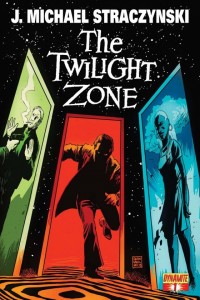 I am not the world’s biggest fan of The Twilight Zone. I recognize that that is a hell of a thing to say for a self-avowed sci-fi fan on the day after SyFy’s (God, remember when it was called The SciFi Channel? And they showed science fiction programming as opposed to wrestling specials and movies about animals mixed with monsters and / or weather events?) two-day marathon of the show, but that’s just the way it is.
I am not the world’s biggest fan of The Twilight Zone. I recognize that that is a hell of a thing to say for a self-avowed sci-fi fan on the day after SyFy’s (God, remember when it was called The SciFi Channel? And they showed science fiction programming as opposed to wrestling specials and movies about animals mixed with monsters and / or weather events?) two-day marathon of the show, but that’s just the way it is.
I understand the show’s contribution to televised science fiction and horror, but the shows tended to follow a formula: there’s someone with some kind of internal flaw, be it venial (wants more time to read) or mortal (the vanity to get surgery to be as attractive as everyone else). Something happens that seems to give them what they want, and then there’s a twist at the end that makes them pay for their sins. Except for when there are cookbooks and gremlins on the wing, but for a large part, that description covers the show’s formula. It’s a morality play in one act, and it’s a formula that’s never really hooked me in.
And writer J. Michael Straczynski also understands the formula… for the most part. In his first issue of The Twilight Zone series from Dynamite Comics, Straczynski gives us a deeply flawed “protagonist,” who has a powerful wish that is seemingly answered with a mild twist. But Straczynski forgets one part of the formula. And it might not seem like the most important part, but by ignoring it, it really took the experience down a notch for me.
 Podcast RSS Feed
Podcast RSS Feed iTunes
iTunes Google Play
Google Play Stitcher
Stitcher TuneIn Radio
TuneIn Radio Android
Android Miro Media Player
Miro Media Player Comics Podcast Network
Comics Podcast Network